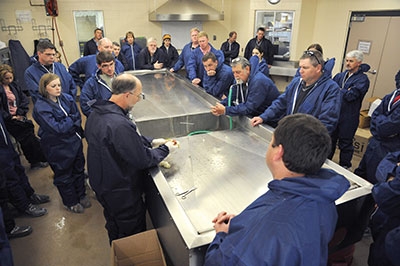
Getting a Head Start
David Manly
Features Business & Policy Company News Business/Policy Canada Poultry Production ProductionUsing the Platinum Brooding checklist to optimize your flock
 Every Platinum Brooding class finishes on chick necropsy, anatomy and disease.
Every Platinum Brooding class finishes on chick necropsy, anatomy and disease. In poultry production, brooding is an important aspect of growth – not just for the birds, but for the farmer as well. However, when brooding is incorrectly managed, deficiencies can result that can severely impact production.
TEACHING HOW
In order to maximize growth, the optimization of brooding is an important step in proper flock management, according to Dr. Stewart Ritchie, president of Canadian Poultry Consultants and S.J. Ritchie Research Farms. Ritchie, who farms broilers in Abbotsford, B.C., knows how important brooding is.
“In my situation, I was responsible for deficiencies in some of the critical management factors associated with brooding in our farm,” he said. “The journey to start collecting data, reading articles and discussing brooding in more detail with other poultry enthusiasts resulted in the development of a Platinum Brooding® checklist.”
COMFORT ZONE
Simply put, the Platinum Brooding program is a checklist-based approach to setting up the brood chamber
prior to and during the brooding period. It is primarily focused on setting up a zone of comfort through the use of accurate measurements, by allowing all the chicks to consume food and water soon after placement, and by setting up their steady state eating patterns early.
“This can have a direct influence on the prevention and mitigation of various diseases, both infectious and non-infectious,” he said.“When precision nutrition and precision management meet, genetic potential is more
likely to be achieved.”
POPULAR PROGRAM
Platinum Brooding has risen in popularity in the eight years since its creation because of its positive results, according to Ritchie, as well as the fact that it can be adapted to meet individual barn specifications. Since its inception, the program has been presented at numerous scientific, industry and corporate meetings over the years, and it continues to be changed and adapted for various purposes.
CLASS ACT
Currently, classes are held regularly – four or five a year – that correspond to the instructors’ broiler farm placement schedule, and each class is approximately six to seven hours in length. Each class begins with a start-up session on biosecurity, followed by a detailed examination of brooding, completion of the Platinum Brooding checklist and familiarization with the use of various sensors.
The class then finishes with a session on chick necropsy, anatomy and disease.
“It is very important that if higher morbidity or mortality is experienced an accurate diagnosis is critical to provide the correct interventions, such as the adjustment of feed and water delivery systems or temperatures, for example,” said Ritchie.
More information about the classes can be found at http://www.platinumbrooding.com/classes.
“In developing the Platinum Brooding class, I have received a lot of help from others; for example, with our class at the farm in Abbotsford, Dr. Vicki Bowes and Dr. Bill Cox present excellent information on chick diseases, anatomy and the fundamental importance of biosecurity for our intensive rearing conditions,” he added. The Aviagen Production School and the University of Georgia have both also incorporated the class into their curricula.
As well, the Platinum Brooding class has recently been incorporated into the British Columbia Broiler Chicken Marketing Board regulations as a requirement for new entrants. “We have also invited the students who participate in the Animal Welfare program at the University of British Columbia, as it is a lot of fun to discuss our brooding (and growing) conditions with these students,” commented Ritchie.
EVERYONE IS INVITED
The instructors invite industry representatives and scientists to attend the class; it has proven to be very productive for students not only to interact with industry representatives in the classroom but also to gain hands-on experience.
While there are plans to possibly expand the Platinum Brooding class to other regions, Ritchie said that the focus for now is to continue to promote disciplined brooding as it can provide benefits to health, food safety, animal welfare and environmental stewardship that help farmers and consumers.
Print this page